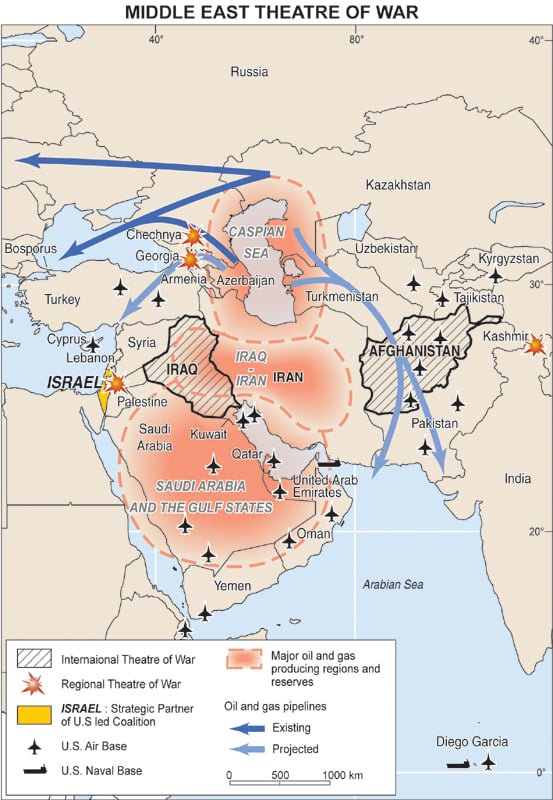By Peter Dyer
September 21, 2008
Q: What do Radovan Karadzic, former French Prime Minister Dominique de Villepin, and George W. Bush have in common?
A: Each lives under the slowly growing shadow of a body of international criminal law.This law is evolving towards the ultimate goal of holding even the most powerful leaders personally accountable for crimes committed by the State.
It is manifested in international agreements and statutes such as the Geneva Conventions, case law, two ad hoc war crimes tribunals (Yugoslavia and Rwanda), and a permanent International Criminal Court.
Radovan Karadzic, former Bosnian Serb President, has been arrested and now awaits trial in The Hague before the International Criminal Tribunal for the former Yugoslavia (I.C.T.Y.) on charges of genocide and crimes against humanity.
Dominique de Villepin is one of 33 French military and political leaders who have recently been accused in a report released by the Rwandan government of arming and advising Hutu leaders in the genocide and crimes against humanity of 1994.
(At the time Rwanda was a French client state and de Villepin was chief aide to French Foreign Minister Alain Juppe. The 500-page report, based on a two-year investigation, accuses both men of crimes including enabling the genocide by violating a United Nations Security Council Arms Embargo against Rwanda.)
George W. Bush in March 2003 ordered “Operation Shock and Awe” (though officially dubbed “Operation: Iraqi Freedom”) – the unprovoked invasion and occupation of Iraq – presenting the world with a clear prima facie case of aggression.
Aggression, in the words of the judgment delivered at the first Nuremberg Trial, is “the supreme international crime” because it unleashes all the other devastation and inhumanity of war.
Personal accountability by state leaders for the crime of aggression – initiating an unprovoked war – is the most profound as well as the most difficult goal of the continuing evolution of international criminal law.
For this reason, and because President Bush is head of the world’s most powerful state, clearly the shadow of the law is at present less ominous to him than to Karadzic or perhaps to de Villepin.
But there is no statute of limitations for any of these crimes. Things change over time, often unpredictably. And the international community has been working steadily towards this difficult goal for decades.
No doubt the work will continue.
Nuremberg PrecedentAlthough the effort to hold leaders personally responsible for crimes of state goes back to the late 19th century, the first significant watershed was the 1946 judgment of the first Nuremberg trial.
A panel of judges from the U.S., U.K., France and the Soviet Union held German leaders personally responsible and punished them for crimes of state, including aggression.
The roots of the Yugoslavia and Rwanda Tribunals are largely in Nuremberg as are those of the International Criminal Court, although neither ad hoc tribunal charter included aggression.
One of the most significant achievements of the Yugoslavia Tribunal was the first ever indictment of an acting head of state, Yugoslav President Slobodan Milosevic, for crimes committed while still in office.
According to the I.C.T.Y. Web site, “the question is no longer whether leaders should be held accountable, but rather how can they be called to account.”
A major problem with the two courts was that they were each temporary responses to a specific set of separate circumstances which had considerable legal overlap.
The ad hoc approach was clearly limited by issues of logistics, expenses and repetition, many of which could have been more effectively addressed by a permanent court.
The achievements of the two tribunals as well as their limitations gave new impetus to the decades-old effort to establish a permanent International Criminal Court.
On July 17, 1998, the great majority of countries of the world voted in Rome, 120 to 7 with 21 abstentions, to establish the International Criminal Court. With the signature and ratification of 60 states the International Criminal Court came into being on July 1, 2002.
Six years later, as of last June 1, 106 countries have ratified the Rome Statute. Written into the Statute is a provision for member states to meet seven years after the entry into force (2009) to consider amendments.
Because the Statute is the result of decades of evolution and five weeks of intense negotiations between 148 countries, it is full of compromises. Even so, it is remarkable.
Never before has the world community united to create an institution invested with legal authority to write, adjudicate and enforce international criminal law. And, despite compromises, it is remarkable for the degree to which so many were able to agree on some basics.
Most important among these is a set of “
core crimes” over which the Court has jurisdiction. These are: 1)
genocide, 2)
crimes against humanity, 3)
war crimes and 4)
aggression (the waging of aggressive war).
Conflict over DefinitionUnfortunately, the Rome conference was unable to agree on a definition of aggression.
Unwilling to leave out “the supreme international crime” containing within itself the “accumulated evil of the whole,” the conference compromised, including aggression among the ”core crimes” but leaving it undefined in anticipation of a future amendment defining the crime and setting out conditions for jurisdiction.
One of the weaker aspects of the Statute is, of course, enforcement. As American Professor Leila Nadya Sadat, a delegate to the Rome conference wrote: “Here classic paradigms of sovereignty in which each state is master of its territory prevail. …The I.C.C.’s ability to effectively enforce international criminal law remains an open question.”
Unfortunately, a major obstacle to the I.C.C., enforcement and otherwise, has been the United States. The U.S. was one of seven countries which voted against the Statute — part of a list which included Iraq, Libya, Israel, Qatar and Yemen. Despite the vote, President Clinton signed the Statute on Dec. 31, 2000.
Less than two years later President George W. Bush “unsigned it.”
Other countries such as Russia and Egypt have signed but not ratified the Rome Statute. Still others such as China and India remain opposed.
If major countries such as Russia, China, India and especially the U.S. ever do decide to join and throw their considerable weight behind the I.C.C. here are a few examples of what the organization may eventually be capable of:
- ”Treaty crimes” such as hijacking and narcotics trafficking, while not yet covered by the Statute, are slated to be discussed and possibly defined and amended into the Rome Statue as early as 2009. There would be an international institution with the legal power to apprehend, try and punish future Osama Bin Ladens without the catastrophic destruction and waste of war.
- The genocide visited by Saddam Hussein upon the Iraqi Kurds (1984-1991) perhaps could have been stopped, or at least punished upon authorization by the Security Council.
- There will be a venue for resolving murky situations such as the recent violence in Georgia, where a court of law could be the only place to finally decide if and when aggression and/or other crimes occurred and who was responsible.
- Assuming that aggression is eventually defined and fully included in the Rome Statute, those who initiate wars of aggression, such as the U.S. invasion of Iraq, will do so knowing there is at least the legal possibility of arrest, trial and prison.
Ironically the United States led the way in establishing the precedent for this when the Allies at Nuremberg tried and punished Germans for aggression and other crimes.
At the moment, the prospect of an American president sitting in the dock of the International Criminal Court seems remote.
It should be remembered, however, that in 1973, nobody would have believed that 33 years later General Augusto Pinochet would die under house arrest in Chile, facing trial on charges of human rights abuses, including kidnapping and murder, committed during the dark days of Chile’s military government.A lot can happen in three decades. Leaders come and go. Power ebbs and flows. National and international perspectives and relationships change.
Imagine the chilling effect the real prospect of arrest, trial and prison for starting a war would have on a head of state considering aggression. Such a simple and powerful deterrent could move humanity significantly closer to realizing the original vision of the United Nations: a world without war.
There simply can be no lasting peace without justice.
To quote Professor Sadat, “As humanity struggles to overcome its darkest impulses in this new millennium, impulses that led not only to the slaughter of hundreds of millions during the 20th century, but threaten our very survival, the creation of effective international institutions and regimes is essential … to transform the prohibitions on the commission of genocide, war crimes, crimes against humanity and aggression into real tools to deter the cruel and powerful.”
Next year in New York, the I.C.C. Special Working Group on the Crime of Aggression is scheduled to conclude their work on a definition of aggression for inclusion as an amendment to the Rome Statute.
A review conference of the full I.C.C. Assembly will convene in 2010 to consider this and other amendments.
The work continues.
Peter Dyer is a freelance journalist who moved with his wife from California to New Zealand in 2004. He can be reached at
p.dyer@inspire.net.nz.

















































